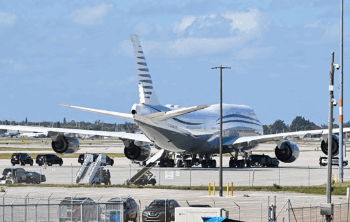A military parade, fly-past, and balcony appearance by the royal family officially began four days of commemorations on Monday to mark the 80th anniversary of the conclusion of World War II in the UK.
King Charles III stood in salute as approximately 1,000 members of the UK armed forces, joined by NATO allies from the US, France, Germany, and 11 Ukrainian soldiers proudly waving their national flag, reached the end of the procession at Buckingham Palace.
Despite the damp weather, tens of thousands gathered along the Union Jack-lined Mall to witness the historic event, which opened with Winston Churchill’s 1945 victory speech, voiced by actor Timothy Spall.
“Do not yield to violence and tyranny, march straight forward and die if need be, unconquered,” bellowed Spall, standing before Churchill’s statue in Parliament Square.
The parade concluded with a fly-past led by the Red Arrows and featuring 23 current and historical military aircraft, which the 76-year-old monarch observed from the Buckingham Palace balcony.
King Charles and Queen Camilla were joined by Princess Anne, Prince Edward, Prince William, Princess Catherine, and their children George, Charlotte, and Louis.
Charles recently told Italy’s parliament that the ongoing war in Ukraine reminds us that “peace is never to be taken for granted.”
“Today, sadly, the echoes of those times -– which we fervently hoped had been consigned to history -– reverberate across our continent,” the king said.
It was from the same Buckingham Palace balcony on May 8, 1945, that King George VI, Queen Elizabeth, their daughters Princesses Elizabeth and Margaret, and Prime Minister Churchill greeted thousands of Londoners in celebration.
Later that evening, the princesses joined the crowds incognito—a night the late Queen Elizabeth II would later describe as “one of the most memorable” of her life.
This year’s events carry special significance as members of the WWII generation become fewer. Many younger people feel less connected to the events of 1939–1945.
“It’s important to remember some of the poor devils who didn’t make it like I did,” said 99-year-old Royal Air Force veteran Dennis Bishop.
Later, a reception at Buckingham Palace will honour veterans and others from the wartime era.
The day began with two massive Union Jack flags being draped over the Cenotaph in London. Many had arrived early, some camping with chairs and blankets.
“It’s so emotional to be here today. Eighty years of peace and peace of mind. Where would we be without them?” asked 76-year-old Patrick Beacon, who arrived early with his wife.
Tourist Ludivine Batthelot, 52, visiting from southern France, said, “We came out of curiosity because it’s the kind of celebration that the English do so well. It’s folklore, we wanted to be in the mood and live the experience.”
Other events include a party aboard HMS Belfast—a WWII-era warship—1940s-themed parties, community gatherings, and art installations around the UK.
On Tuesday, Queen Camilla is scheduled to visit a red ceramic poppy installation at the Tower of London, featuring about 30,000 pieces honouring the fallen.
Thursday will conclude with a nationwide two-minute silence. King Charles, currently undergoing cancer treatment, will attend a service at Westminster Abbey followed by a concert at Horse Guards Parade.
The royal family reportedly hopes recent developments—such as a high-profile interview by Prince Harry—won’t overshadow the commemorations. Meanwhile, pubs have been granted extended opening hours throughout the celebration period.
What you should know
The 80th anniversary of the end of World War II is being marked with large-scale public commemorations across the UK, just as in past decades. However, the mood is different in 2025.
Fewer WWII veterans remain to share their stories, and the presence of modern conflicts—particularly the war in Ukraine—casts a somber shadow over what would otherwise be purely celebratory.
In contrast to earlier anniversaries, such as the 75th in 2020, this year’s commemorations are not only about remembrance but also serve as a reminder of the fragility of peace.
King Charles III’s remarks on the echoes of past wars in today’s Europe encapsulate this message.
While public participation remains strong, especially in London and major cities, there’s an increased emphasis on educating younger generations and preserving the memory of a fading wartime legacy.
ALSO READ TOP STORIES FROM VERILY NEWS


















